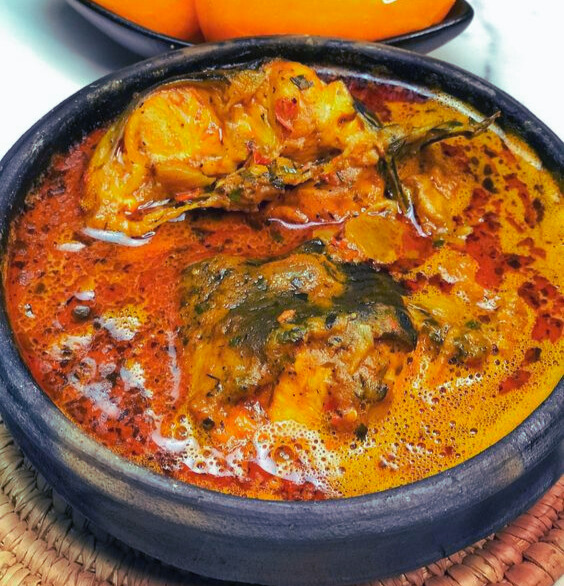- Prepare the Palm Nut Concentrate: If using canned palm nut pulp, skip to cooking the meats. If you have fresh palm nuts, boil them for 30 minutes, then pound and mix with water to extract the juice. Strain to remove the husks and set the concentrate aside.
- Cook the Meats: In a large pot, combine the meats with chopped onions, a pinch of salt, and enough water to cover them. Cook until tender, about 30-45 minutes, depending on the types of meat used. Add more water as needed to prevent burning.
- Add the Palm Nut Concentrate: Once the meats are tender, add the palm nut concentrate or pulp to the pot. Stir well and bring to a boil. Reduce the heat and simmer for about 10 minutes, allowing the soup to thicken slightly.
- Incorporate Other Ingredients: Add the ground crayfish, Banga spice mix, Scotch bonnet peppers, and ogiri okpei (if using) to the pot. Stir well to combine. Add the dried or smoked fish and continue to simmer the soup on low heat for another 15 minutes. The flavors should meld together beautifully.
- Adjust the Seasoning and Greens: Taste the soup and adjust the seasoning with salt as needed. Add the dried bitter leaves or spinach, and simmer for an additional 5 minutes. The leaves should not overpower the soup but complement its rich flavor.
- Serve: Banga Soup is traditionally served hot with a side of starchy accompaniments like fufu, pounded yam, or white rice. It’s a rich, hearty soup that’s perfect for special occasions or a comforting weekend meal.
Why This Recipe Works:
Banga Soup’s unique flavor comes from the palm nut concentrate, which provides a rich, creamy base that’s unlike any other soup. The combination of meats and fish adds depth and heartiness, while the traditional spices and Scotch bonnet peppers introduce a warm, aromatic heat that’s deeply satisfying. The addition of bitter leaves or spinach introduces a slight bitterness that balances the richness of the soup, making each spoonful a delightful experience.
Conclusion:
Banga Soup is a testament to the rich culinary traditions of West Africa, offering a taste of the region’s abundant flavors and ingredients. This recipe is a great way to explore African cuisine and introduce your palate to new tastes and textures. Whether you’re familiar with African dishes or trying Banga Soup for the first time, this meal is sure to impress with its depth of flavor and comforting warmth. Enjoy the process of making this traditional soup and the delicious results of your efforts.
